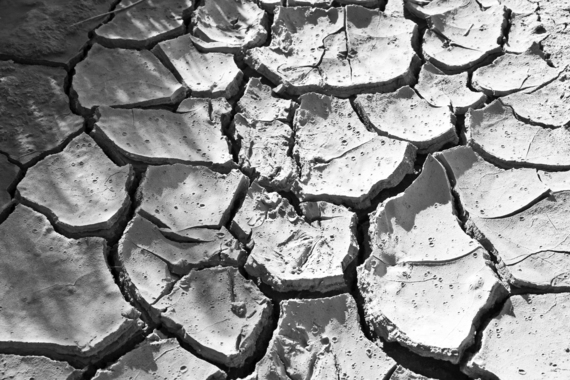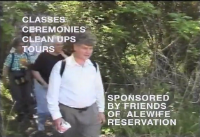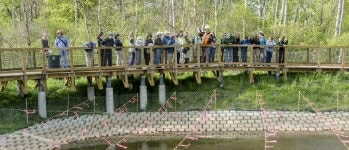Twenty-two years ago, the United Nations General Assembly declared March 22 to be World Water Day. In a world is facing a severe and growing water crisis without a roadmap, this day is more important than ever.
Our collective abuse of water has caused the planet to enter "a new geologic age" -- a "planetary transformation" akin to the retreat of the glaciers more than 11,000 years ago. This is according to 500 renowned scientists brought together in Bonn at the invitation of UN Secretary-General Ban Ki-moon on May 2013. A majority of the world's population lives within 30 miles of water sources that are badly impaired or running out.

photo: Bert Kaufmann, Flickr Creative Commons, Drought
The water crisis is also our greatest security threat. This is according to 900 global experts asked to assess the world's biggest global risks in advance of the World Economic Forum's annual meeting. Another global study warns that by 2030, demand for water will outstrip supply by 40 per cent. Lack of access to clean water is already by far the greatest killer of children.
So how are world leaders and global institutions dealing with this threat? Very badly and with no plan. This is because the water crisis has been misdiagnosed.
While recognized as real, the water crisis is usually seen as a symptom of climate change, itself caused by excessive greenhouse gas emissions. Droughts are almost always reported as the result of climate change. While no doubt greenhouse gas emission-driven climate change does have an important and negative impact on watersheds, warming temperatures and speeding up evaporation, there is another story that needs to be told.
Massive water diversion for flood irrigation and the over-exploitation of groundwater has left large areas of the world without water. The destruction of the Aral Sea and Lake Chad -- once the fourth and sixth largest lakes in the world respectively -- was not caused by climate change. It was a result of relentless extraction for commodity exports.
The drought crisis in California is not climate change per se, but the massive engineering of the state's water supplies to provide for a handful of powerful farmers. A huge amount of the state's water is exported as "virtual water" embedded in export commodities. The Ogallala Aquifer is not being depleted by climate change, but from unremitting extraction, mostly for corn ethanol.
Removing water from water-retentive landscapes leaves behind parched lands and desertification, another cause of the water crisis. Removing vegetation from water-retentive landscapes changes the water patterns forever. The current crisis in Brazil -- once a water rich country -- is largely due to the destruction of the rainforest. Take down the forests and the hydrologic cycle is negatively affected.
Because the water crisis is misdiagnosed, we do not have the right solutions to solve the crisis. World leaders, elected officials and international institutions wrap the water crisis in with their research and deliberations on climate change. If water is mentioned at all, it is as one more victim of climate change, almost always solely attributed to the burning of fossil fuels. The fact that destroying water-retentive landscapes is in and of itself a major cause of climate change is not part of the analysis or discussion in climate change circles.
As a consequence, flawed as it is, there is a very serious process to deal with climate change, including an annual climate summit every December and multiple preparatory meetings in between. But there is no corresponding process to deal with the global water crisis.
The UN General Assembly has not specifically included water in its agenda. The 1992 Rio Earth Summit targeted water, climate change, biodiversity and desertification for action; all but water have since been addressed with a convention and a plan. There is no coordinated response to the world's growing water crisis, even as it threatens life on earth, either inside the United Nations or among nations. Any attempt at answers is local, sporadic and underfunded.
Water must be addressed as an issue in and of itself. There is an urgent need to create a global water recovery plan for water.
Key components would include:
- watershed protection
- conservation and restoration
- national and community programs to replenish water-retentive landscapes
- watershed sharing and governance
- models of food and energy production that do not harm water
- the prevention of eutrophication
- consideration of the impact on water of trade agreements
- strong local, national and international commitment to put water protection at the heart of all laws and policies.
The notion that water can become a negotiating tool for cooperation and peace rather than the cause of conflict and war must be explored and the path to water justice must be a central tenet of this plan.
Five years ago, the United Nations General Assembly adopted a historic resolution. It recognized water and sanitation as fundamental human rights. It is urgent that the United Nations and world leaders now take the next step toward a water-secure future. They need to commit to creating a global water recovery plan for water that has its own convention, plan of action and the resources needed to meet the greatest threat of our time.
Maude Barlow is a Canadian who has been a leader in the fight for the human right to water. She served as Senior Advisor on Water to the UN General Assembly. Her latest book is Blue Future, Protecting Water for People and the Planet Forever.
Article preserved 2015-03-23 from
http://www.huffingtonpost.ca/maude-barlow/world-water-day_b_6911660.html
- Home
- Directions
- FAR Wildlife Blog
- Calendar
- News
- Donate Now
- Get Social!
- Storm Water Wetlands
- Plants and Restoration
- Photos
- Videos
- About & Projects
- Master Plan for Alewife
- Archive
- Newsletters
- Contact
 Presentation Spotlighting Alewife Reservation
Presentation Spotlighting Alewife Reservation
 Follow us on Twitter
Follow us on Twitter
 Like us on Facebook
Like us on Facebook
 Follow us on Instagram
Follow us on Instagram
Forward our web address to a friend!
- An Urban Gem - Alewife Reservation Nature Preserve
- Envisioning The Silver Maple Forest
- History and Policies of Cambridge, Belmont, and DEP
- Storm Water Wetlands
- Friends of Alewife Reservation brochure
(front, back) - Technical Analysis of Upper Alewife Basin
- Watershed: An Excursion in Four Parts
- The River Is A Restless Spirit: Life in the floodplain forest
-
Assessment of Silver Maple forest for DEP Adjudicatory hearings and
Patrick Fairbairn, author of the Assessment - Community Native Garden Flora
The
Alewife Reservation
is a unique natural resource for the communities of Belmont, Arlington and Cambridge
and home to hundreds of species, including hawks, coyotes beavers, snapping turtles, wild turkeys and muskrats,
the reservation is a unique natural resource for the community.
Historical information (Powerpoint)
Friends of Alewife Reservation works to protect and restore this wild area and the surrounding area for the water quality, native plants, animals and over 90 bird species with paths for walking, running and biking, recreation, and for classroom education and research. We regularly steward and preserve the Reservation area for wildlife and for the enjoyment of present and future generations.

(video)
By-Laws
About Friends of Alewife Reservation
Statement of Purpose
Citizen Forester newsletter archive
The Birds of the Cambridge Region of Massachusetts

by William Brewster 1906
Nuttal Ornithological Society
Biodiversity Study of Alewife Reservation Area: Species, Habitat, Ecosystems

Inventories by David Brown, wildlife assessor (2003, 2004.) Published by and available from FAR for $10. Write or call for your copy. (sample)
Updated Dave Brown Inventories (2008, 2010)
Inventories of Alewife Reservation Wetland Plants by Walter Kittredge, Botanist (2013)

